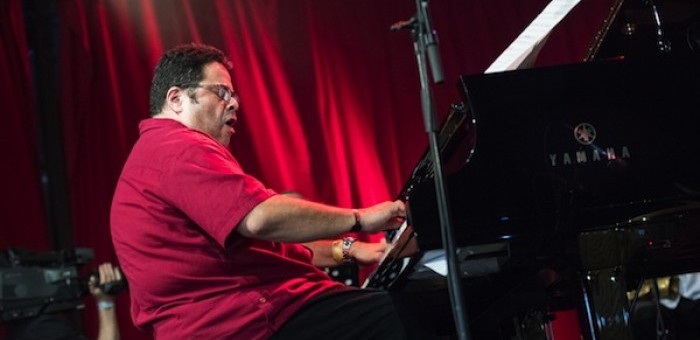Jan 13, 2026 2:09 PM
More Trump-Kennedy Center Cancellations
The fallout from the renaming of the John F. Kennedy Center for the Performing Arts to include President Donald…

Arturo O’Farrill performs at the North Sea Jazz Festival.
(Photo: Steven Sussman)It was a long time coming. Prior to this year, pianist/bandleader Arturo O’Farrill’s last appearance at the North Sea Jazz Festival occurred more than 30 years ago, when he was a member of the Carla Bley Big Band (1979–1983). In July in Rotterdam, the 56-year-old not only made his debut as a leader directing his dynamite Afro Latin Jazz Orchestra, but the festival also afforded him two nights to perform his sizzling, border-crossing Latin music, featuring rhythm as the dominant force.
In fact, the way O’Farrill sets up his 18-piece big band accentuates the rhythm section by placing the drummer, percussionists, bass player and piano front and center, with the accompanying array of horns arranged in an arc at the rear of the stage.
On the first evening (July 8), O’Farrill, dressed in a red shirt that quickly became saturated with sweat, commanded the stage at the packed house of the Hudson venue. He opened with the Spanish Harlem Orchestra’s Oscar Hernandez tune “Rumba Urbana,” which O’Farrill called a “psychedelic boogaloo.” It bloomed with dynamics as the full orchestra—saxophones, trumpets, trombones—played off a percussive groove, with O’Farrill tapping out a repetitive piano beat before exploding into a swinging solo.
That tune was followed by the grandiose “The Triumphant Journey,” the leadoff track of O’Farrill’s latest album, Cuba: The Conversation Continues (Motéma), which was recorded in Havana. For this Dafnis Prieto composition, O’Farrill opened the piece with a sober piano break followed by a sea of horns that sounded like they were playing classical music with slices and slivers of percussion keeping the beat alive before a Latin groove kicked in—all without a hint of clichés.
Cuba: The Conversation Continues offers a strong theme of furthering the integration of Latin American music into the jazz idiom—as started years ago with Dizzy Gillespie and Chano Pozo. The centerpiece of the album, as well as the powerhouse performance in Rotterdam, was O’Farrill’s Grammy-winning, four-movement “Afro Latin Jazz Suite.” He introduced it by calling it “a tribute to my father, Chico O’Farrill, that will not replicate his music.”
After opening with a barrage of swirling tenor notes by Chad Lefkowitz Brown and Ivan Renta, the rest of the band drove into a rippling dance with a rush of horns blown with a rhythmic vitality, plus a deep-hued blast on baritone sax by Larry Bustamante, and calabash and cajón beats. The spotlight performer was alto saxophonist David Bixler, who pushed the music with his exuberant extended solos.
O’Farrill further energized the suite with his fast, churning piano chords and exclamatory single-note flights across the keys. In the midst of the suite were pockets of lyrical calm, syncopated conga runs, orchestral quirkiness, whimsical hits, and fiery and ferocious trumpet interludes (with Jim Seeley leading the way). At key junctures in the suite O’Farrill joyfully jumped up and animatedly conducted the band.
The performance on the second evening (July 9) at the Congo—an open-air space covered by a tent-like structure—mirrored the previous evening’s show, including a launch into Juan Tizol’s “Caravan” (which Gillespie featured on his Afro-Cuban landmark album, 1954’s Afro, in collaboration with Chico O’Farrill). This rendition was fueled by a cacophony of horns, trumpet-trombone tradings and growling and dripping instrumental voicings.
One of the highlights at Congo was O’Farrill’s politically outspoken “Trump, Fuck Trump,” a tune he expounded on by saying he was heartbroken by that “horrible fat-fingered man with an orange toupee and orange skin whose heart doesn’t care and who brings people to divide.” With a dissonant and fractured piano open, a stop-and-start whirl of horns, and turbulent percussion, the ALJO instrumentally blasted the Republican presidential candidate. As if on cue, a dog outside the tent incessantly barked throughout the song.
Afterward, O’Farrill continued his socio-speak to the rapt audience by saying that even though there was a darkness, it was for him a “sacred moment” and a “thrill to be playing here with my orchestra.”
He added, “We’re so anti-war, so anti-Congress, so anti-consolidation. By playing our music, we are doing something subversive.”

Belá Fleck during an interview with Fredrika Whitfield on CNN.
Jan 13, 2026 2:09 PM
The fallout from the renaming of the John F. Kennedy Center for the Performing Arts to include President Donald…

Peplowski first came to prominence in legacy swing bands, including the final iteration of the Benny Goodman Orchestra, before beginning a solo career in the late 1980s.
Feb 3, 2026 12:10 AM
Ken Peplowski, a clarinetist and tenor saxophonist who straddled the worlds of traditional and modern jazz, died Feb. 2…

The success of Oregon’s first album, 1971’s Music Of Another Present Era, allowed Towner to establish a solo career.
Jan 19, 2026 5:02 PM
Ralph Towner, a guitarist and composer who blended multiple genres, including jazz — and throughout them all remained…

Rico’s Anti-Microbial Instrument Swab
Jan 19, 2026 2:48 PM
With this year’s NAMM Show right around the corner, we can look forward to plenty of new and innovative instruments…

Richie Beirach was particularly renowned for his approach to chromatic harmony, which he used to improvise reharmonizations of originals and standards.
Jan 27, 2026 11:19 AM
Richie Beirach, a pianist and composer who channeled a knowledge of modern classical music into his jazz practice,…